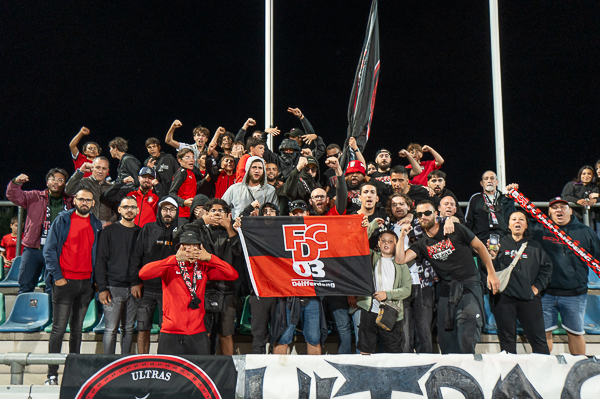 Ultras FC Differdange 03;
Credit: Ali Sahib, Chronicle.lu
Ultras FC Differdange 03;
Credit: Ali Sahib, Chronicle.lu
For more than six months, I have been deeply immersed in Luxembourg’s sporting scene, observing not only the competitions themselves but, above all, the passion and culture of the fans in the stands.
From football and basketball to tennis and swimming, and beyond, encompassing both team and individual sports, played both indoors and outdoors, I have followed how different supporter groups shape the atmosphere and bring their own identity to the games.
Supporters are always an inseparable part of sport. They create the atmosphere that surrounds every competition, celebrating victories with the players and sharing in their setbacks.
In many ways, fans become the “twelfth player” or the “extra teammate”, influencing the energy on the field or court and giving athletes an additional source of motivation. At the same time, in a small country like Luxembourg, fan culture has its own specific features: it is less about sheer numbers and more about closeness, identity and community. Yet it also reflects global trends, from passionate ultras to family-oriented support, making the Grand Duchy a fascinating place to observe how local and international fan traditions intertwine.
Luxembourg Club Football
So far, I have attended only a handful of BGL Ligue (top tier) football matches, but it quickly became clear that one of the most active supporter groups belongs to the reigning champions, FC Differdange 03. This was particularly evident during the club’s UEFA qualifying campaign at the start of the 2025/26 season, when their fans turned out in force.
By contrast, the atmosphere at home games of UNA Strassen and Racing Union Luxembourg in the UEFA Conference League qualifiers felt noticeably different - each club with its own character but with a smaller core of vocal support. The most striking memory for me remains Differdange’s home match against Kosovo’s FC Drita at a packed Stade Municipal in Differdange. After a first-leg defeat away, the prospect of a comeback at home kept emotions running high, with supporters playing their part in pushing the team until the final whistle.
In talking to Claudio, a long-time member of Differdange’s supporters group who has followed the club for nearly ten years, I gained a clearer sense of what this culture means to those inside it. He recalled how the group’s roots go back to futsal (indoor 5-a-side football), where Differdange enjoyed a run of titles and created a tradition of celebrating together. “European matches are always good feelings because it’s another level… it’s always good when you can hear your guys push up the team,” he said.
Claudio stressed that there is no strict programme behind their support: the group simply sings from kick-off until the final whistle, adjusting to the rhythm of the match and the emotions of the day. Inspiration comes from other ultras across Europe - particularly in Paris - but chants are adapted into Luxembourgish, with banners, posters and stickers created entirely by the group itself. For him, this do-it-yourself approach is part of what defines the meaning of being an ultra in Differdange.
Luxembourg national football team
The national football team also enjoys passionate backing, particularly during matches at the Stade de Luxembourg. The most active section of support comes from a group known as M-Block, named after the stand where these fans gather. Unlike traditional club-based ultras, M-Block brings together a mix of supporters from different clubs, as well as individuals who are not affiliated with any particular team but want to contribute to the atmosphere for the national team's home matches.
New head coach Jeff Strasser also referred to them in an interview with Chronicle.lu: “M-Block and other names of supporters are like ultras in other clubs, but they are not aggressive. They are just supporting the team in a very good way. And it’s important also to have them behind us.”
At each of the three home friendlies I attended in 2025, I witnessed first-hand how warmly the players thanked them after the final whistle. This was the case in the victory over Sweden, the draw against Ireland and even after the defeat to Slovenia.
From my personal observations, support in Luxembourg cannot be compared in scale to that of larger countries, yet this is precisely what makes it distinctive. For smaller clubs, every chant and banner carries greater weight, and the presence of even a few dozen dedicated fans can transform the atmosphere and give players a sense of pride and belonging.
Basketball
Moving indoors, I also attended both women’s and men’s matches in the Enovos Basketball League last season. Alongside families with children, there are groups of active supporters who bring drums and chants, creating a lively backdrop even in regular fixtures. The atmosphere is more intimate than in football stadia, but this changes significantly during the play-offs, when places in the semi-finals and finals are at stake.
The highlight for me was the men’s Luxembourg Cup Final between Basket Esch and Etzella Ettelbruck at the Coque sports complex in Luxembourg-Kirchberg. The arena was packed, and although Esch were not the favourites, around a hundred of their fans, dressed in black, gave relentless support throughout all four quarters - and were rewarded with a famous victory. Etzella, despite losing that final, later lifted the league trophy after defeating T71 Dudelange, and they too showed how deeply fan traditions matter. Following the championship win, the players sat down on the court in front of their supporters’ stand and joined in the chants before celebrating loudly together.
The atmosphere inside a basketball arena is totally different to that of a football stadium: the closeness to the court, the constant chants and the sense of “basketball culture” are striking. It also points to the potential of other indoor sports in Luxembourg, where the connection between fans and athletes can be even more direct.
Tennis
Another highlight for me came from tennis, when Luxembourg’s men’s national team faced Lithuania in the Davis Cup World Group I play-off, also at the Coque. Despite an opening loss by home favourite Chris Rodesch, Alex Knaff revived Luxembourg’s chances by defeating Lithuania’s top player and levelling the tie.
On the second day, the atmosphere in the stands pushed Gilles Müller’s team to stage a comeback. In the doubles match, every missed shot and every winning point by the Luxembourgish pair drew immediate reactions from the crowd, creating an intensity that the visitors could not handle. The tie ended 3-1 in Luxembourg’s favour, sparking celebrations that turned into a genuine moment of unity between players and fans.
As Alex Knaff explained afterwards: “We know that they are good players also, so they played a bit better in the second set, but we stayed the course and then we got some moments also with the crowd and we knew that in the tiebreak we had the experience and we could get it done.” His words summed up how decisive the fans’ presence had been in shaping the outcome.
Conclusions
There are still many sports I have yet to attend in Luxembourg, but that remains ahead of me. What I can already say with certainty is that the atmosphere created by fans here is no less passionate than in other countries. The scale may be smaller, but the closeness, sincerity and sense of community stand out as strong points. Fan culture in Luxembourg also reflects global trends - from ultras and fan clubs to family sections and the occasional challenges of crowd management - yet with its own distinctive touch rooted in local identity.
Ultimately, the fan movement in Luxembourg is an inseparable part of sport, shaping the atmosphere and giving meaning to competitions. In a small country, it is not only about supporting a team but also about building community and belonging. This is why it is worth speaking more about fans as active participants in sporting life. The energy they bring - especially from the youngest generations, including children and teenagers in the stands - compels sport to grow, evolve and become even more attractive to players and audiences alike.









